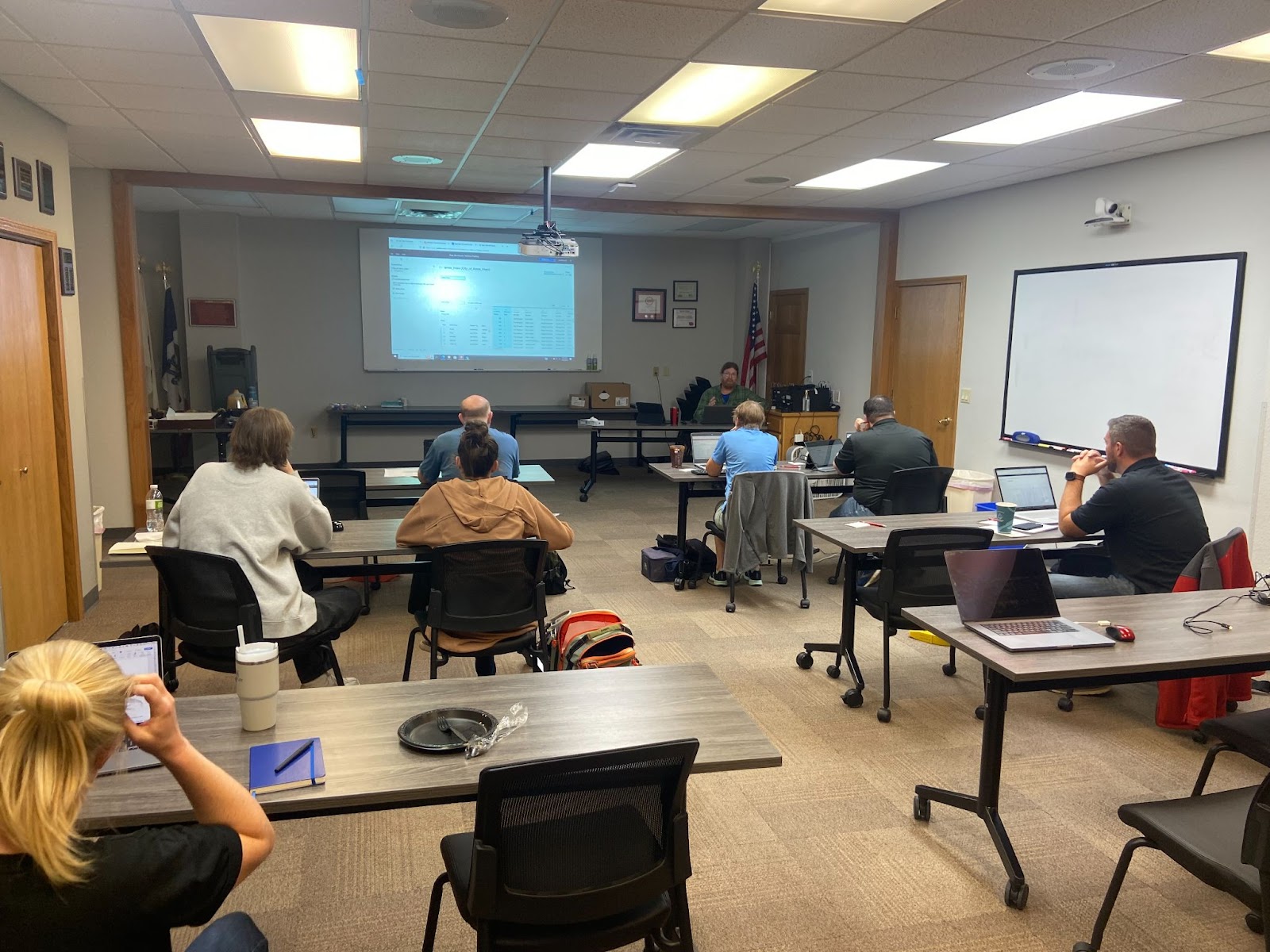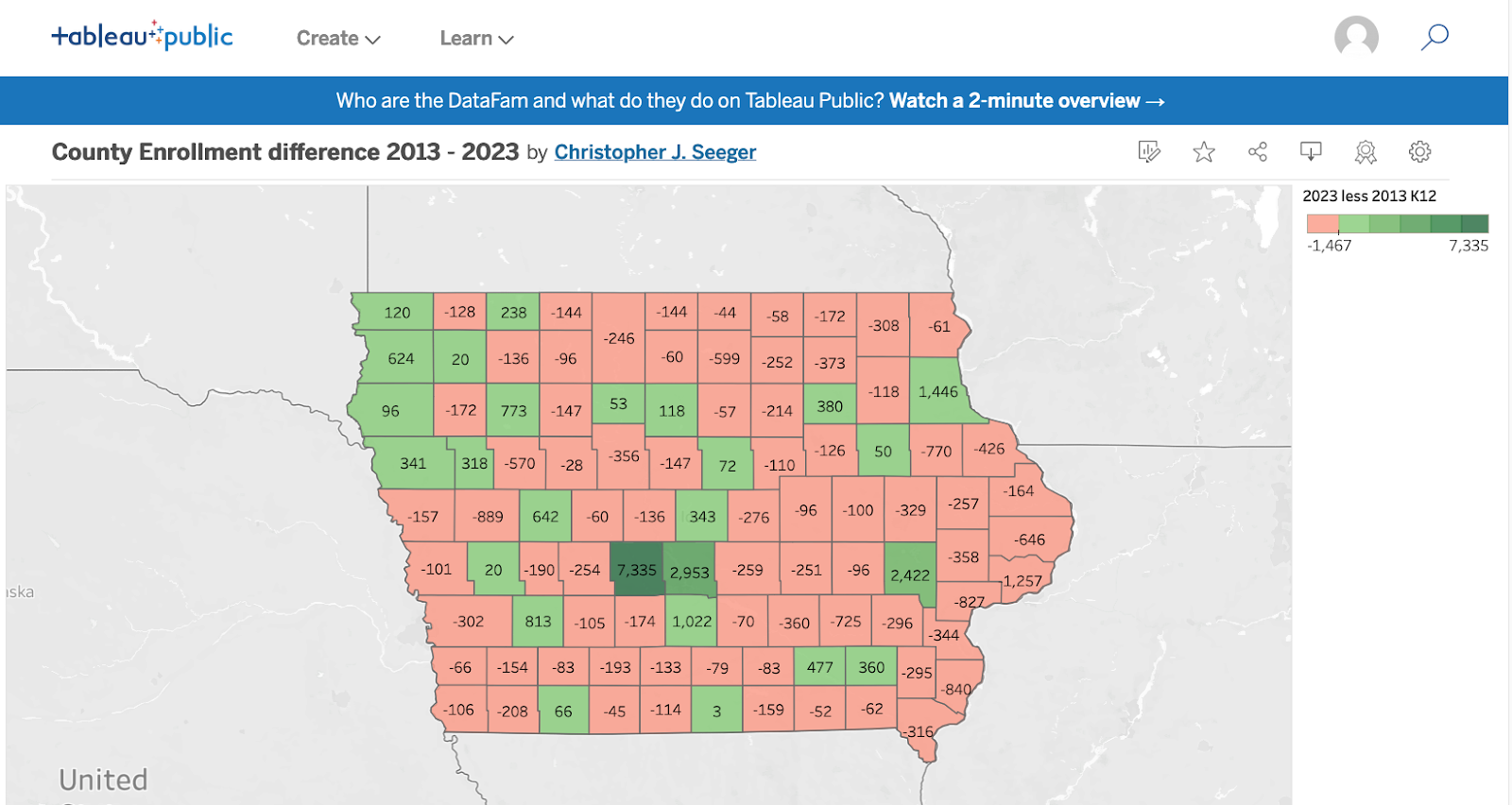By Francie Fink
This story is part of a series on partnerships developed by the Midwest Big Data Innovation Hub with institutions across the Midwest through the Community Development and Engagement (CDE) Program.
Across the country, cities and towns are transforming the way they govern by prioritizing data literacy and evidence-based decision-making [pdf]. With improved protocols in place to collect and analyze data, cities can turn numbers into action for tangible results: faster emergency-response times, reduced environmental waste, and more-effective solutions to traffic. But it’s not just about efficiency; it’s about trust. By using data to set clear goals and being transparent about their progress, cities are strengthening the bond between residents and the services they rely on every day.
In rural Iowa, local leaders face a challenge that echoes across the nation: they’re stuck relying on broad state or federal datasets to design community events, services, and interventions. Without access to detailed local data, smaller towns and cities are left guessing how to best serve their residents—a frustrating gap that limits impact and innovation.
For instance, a local food bank might rely on state-level data to estimate the number of households experiencing food insecurity. But the state data may not reflect the unique challenges of that community, such as recent layoffs at a local factory or the needs of seasonal workers. As a result, that food bank might understock some foods, with real consequences for residents seeking assistance.
Iowa State University (ISU) Extension and Outreach has been working on addressing these gaps in data and equipping those who need data with the skills to use it for many years. Christopher J. Seeger is a Morrill Professor of Landscape Architecture and Extension Specialist in Geospatial Technology at ISU. In his years with ISU Extension, Seeger has worked plenty with demographic data and geospatial design, becoming an expert in cataloging large amounts of information.
In his current capacity, Seeger oversees three programs that address data literacy. One, the Community Indicators Program, works to share Census and other state data in visually compelling products for use by students, community development specialists, local decision-makers and the public throughout the state. Another, a geographic information system (GIS) training program, aims to upskill students, local leaders, and teachers in easy-to-use mapping and data-analysis tools. And finally, the Data Science for Public Good Program brings Iowa students together to develop solutions for challenges faced by local and state governments, focusing on significant social issues that resonate on a global scale today.
Seeger and others at ISU Extension began thinking about how the format of the GIS training program might extend to more general community-data-analysis needs in late 2023. They wanted to equip citizens and leaders with simple tools to collect the right data and the methods to share it back with their communities. To accomplish this, they partnered with the Midwest Big Data Innovation Hub (MBDH) through its Community Development and Engagement Program to host a three-part workshop series, geared towards nonprofits, county staff, extension staff, and department leaders in a four-county region near Dubuque, Iowa.
The workshop sessions were carefully planned and intentionally designed to lay a curriculum for years to come. “The big task at hand for us was thinking through the best modes of delivery and selecting the right tools to foster data literacy,” Seeger explained. In the end, the Extension team was very pleased with the tool kit they had put together: explainers on Tableau Public, Google Sheets, GitHub Pages, and GeoJSON.
Seeger and two other Extension specialists were able to work closely with participants. The workshop had 30 signups altogether, though six individuals completed the coursework in full. Seeger says that, in the future, the team may consider a fully online program to accommodate folks traveling long distances to learn. The smaller group format had its definite benefits, though, the team came to discover.
“We were able to understand from the participants their own needs when it comes to data collection and analysis,” said Seeger. Colleague and data analyst Bailey Hanson elaborated, “While facilitating the workshops, I learned that participants often have excellent ideas for what they want to achieve, and with a little training and hands-on guidance, they can bring those ideas to life. This experience reinforced the importance of combining training in technology and data methodology with practical support to empower participants to achieve their goals.”
“While facilitating the workshops, I learned that participants often have excellent ideas for what they want to achieve, and with a little training and hands-on guidance, they can bring those ideas to life. This experience reinforced the importance of combining training in technology and data methodology with practical support to empower participants to achieve their goals.” — Bailey Hanson, Iowa State Extension
One participant was a volunteer with their local school system, interested in creating a dashboard that tracks student-truancy metrics. They hoped to be able to better demonstrate to their school committee the trends of student absences in meetings, to better develop a plan of action. Another participant wanted to better track attendance and scheduling for their local 4H chapter.
The first online session was an introduction to data visualization, and served as a way to assess the data skills that participants had coming into the series. Participants learned about which tools existed for different purposes. For instance, you might use GeoJSON to map the outline of a parade route for your city. Also at this session, the Extension team discussed with participants how to best construct Internet searches to find the data they need. Seeger and his team even touched on artificial intelligence (AI) and how it might be used with integrity.
The second, most extensive session, was fully on site. At this stage of the workshop series, participants were walked through the Tableau Public web version by Extension specialists. Throughout the session, the team worked through four relevant examples to the participants. For example, they demonstrated how a city’s tree database file could be analyzed to query attributes of different tree species, and even extended to create a map of city-managed trees.

Pictured: Participants learn how to analyze geospatial data in the second of three data-literacy workshops.
In the final session, participants presented what they had learned and worked on to date. By the end of the three-part workshop, almost every participant had created a working dashboard in Tableau Public. The participants were energized by their progress throughout the sessions. They were amazed at how much data is actually out there for use and impressed by how many free and open-source tools are available to create visually appealing summaries of data. “Helping the participants identify the resources for continued learning was another thing that we prioritized,” said Seeger.

Pictured: Example visualization, created in Tableau Public, outlining changes in K–12 school enrollment across Iowa from 2013 to 2023.
The success of the workshop series was evident, and as it came to an end, the Extension team reflected on how to keep the momentum going. For one, they wanted to offer more courses on data literacy: accessing data using R, an introduction to GIS, and a more advanced version of the Tableau training. The Extension team has already been asked to deliver the workshop in another county. ISU Extension isn’t just teaching technical skills—they’re fostering a culture of evidence-based problem-solving that can shape smarter, more-responsive communities for years to come.
Learn More/Get Involved:
Contact the Midwest Big Data Innovation Hub if you’re aware of other people or projects we should profile here, or to learn more about other Community Development and Engagement projects we’ve supported. The Midwest Big Data Innovation Hub is an NSF-funded partnership of the University of Illinois at Urbana-Champaign, Indiana University, Iowa State University, the University of Michigan, the University of Minnesota, and the University of North Dakota, and is focused on developing collaborations in the 12-state Midwest region. Learn more about the national NSF Big Data Hubs community.
